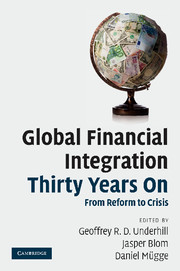Book contents
- Frontmatter
- Contents
- List of figures
- List of tables
- Notes on contributors
- Preface
- Acknowledgements
- List of abbreviations
- Introduction: the challenges and prospects of global financial integration
- Part I History and context: input, output and the current architecture (whence it came)
- Part II Assessing the current financial architecture (how well does it work?)
- 5 Adopting international financial standards in Asia: convergence or divergence in the global political economy?
- 6 The political economy of Basel II in the international financial architecture
- 7 The catalytic approach to debt workout in practice: coordination failure between the IMF, the Paris Club and official creditors
- 8 Empirical evidence on the new international aid architecture
- 9 Who governs and why? The making of a global anti-money laundering regime
- 10 Brazil and Argentina in the global financial system: contrasting approaches to development and foreign debt
- 11 Global markets, national alliances and financial transformations in East Asia
- Part III Does the future hold? Reactions to the current regime and prospects for progress (where is it going?)
- Conclusion: whither global financial governance after the crisis?
- References
- Index
11 - Global markets, national alliances and financial transformations in East Asia
Published online by Cambridge University Press: 02 December 2010
- Frontmatter
- Contents
- List of figures
- List of tables
- Notes on contributors
- Preface
- Acknowledgements
- List of abbreviations
- Introduction: the challenges and prospects of global financial integration
- Part I History and context: input, output and the current architecture (whence it came)
- Part II Assessing the current financial architecture (how well does it work?)
- 5 Adopting international financial standards in Asia: convergence or divergence in the global political economy?
- 6 The political economy of Basel II in the international financial architecture
- 7 The catalytic approach to debt workout in practice: coordination failure between the IMF, the Paris Club and official creditors
- 8 Empirical evidence on the new international aid architecture
- 9 Who governs and why? The making of a global anti-money laundering regime
- 10 Brazil and Argentina in the global financial system: contrasting approaches to development and foreign debt
- 11 Global markets, national alliances and financial transformations in East Asia
- Part III Does the future hold? Reactions to the current regime and prospects for progress (where is it going?)
- Conclusion: whither global financial governance after the crisis?
- References
- Index
Summary
In East Asia – as in many other developing regions – the liberalisation and globalisation of financial markets over the past two decades has led to the exponential growth of stock markets in traditionally bank-based systems. The increased importance of equity finance has fuelled incentives for industrial firms to rely on stock markets instead of banks for external financing. The collective outcome of these individual choices has been the rapid securities market orientation of national financial systems. East Asian financial capitalisms, however, have not converged on the liberal market model epitomised by Britain and the United States. As we will see below, regulatory regimes, market operations and corporate governance models continue to diverge from those of financial liberalism.
The central proposition advanced here complements the major themes of this volume by viewing successful financial market reform and governance as a function of interacting systemic and domestic factors. It contains the normative implication that while global market integration has reshaped national institutions, the international architecture developed to manage the process needs to be sensitive to policy imperatives associated with national configurations of power and interest: effectiveness requires the articulation of national preferences on the input side, and policy space on the output side. Otherwise national systems will likely react against the architecture, impairing the necessary political cooperation underpinning regional and global governance.
- Type
- Chapter
- Information
- Global Financial Integration Thirty Years OnFrom Reform to Crisis, pp. 204 - 220Publisher: Cambridge University PressPrint publication year: 2010



